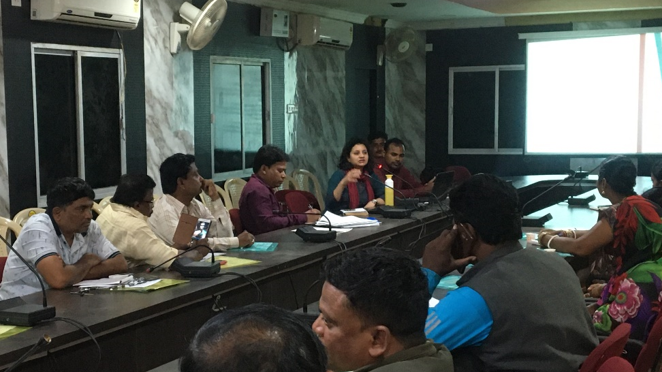A Watershed India workshop looked into the role of the Gram Panchayat (village council) in WASH budget tracking.
The 73rd Constitutional Amendment Act (CAA) of 1992 created Panchayati Raj Institutions (PRI) as institutions of local self-governance in India. The Act aimed to work two ways: decentralising governance to the lowest tier, enabling political representation of the community. Secondly, through devolution of funds, functions and functionaries, enabling the community to plan, implement and monitor development programmes for itself.
The intent of the 73rd CAA is highly valuable keeping in mind economic and social disparities between and within regions and states, and the need to involve communities in the development process. On the ground, however, the efficacy of Gram Panchayats (GPs) as decentralised and devolved institutes to deliver development programmes vary from state to state. In some states, GPs face several challenges. These challenges came to the forefront at the district sharing and validation workshop on budget tracking held on 24 January 2020 in Ganjam district, Odisha. Organised as part of the Watershed programme, by Gram Utthan (landscape partner in Odisha), Centre for Budget and Governance Accountability (technical partner) and IRC, the workshop saw participation of community members, PRI leaders, government officials and civil society organisation (CSO) representatives.
The purpose of the workshop was to disseminate and validate the analysis of the water and sanitation budget at the district level and below (block and Gram Panchayat), collected with the help of the CSOs. In the series of workshops aimed at building CSO capacity in planning for WASH, this workshop tied together the efforts to understand the institutional architecture in planning and implementation of WASH plans, the sources of funds available, and the challenges in realisation of the WASH plans. Budget data was collected to understand if the challenges were related to budget policy (inadequacy of funds) or budget procedure (inability to effectively use available budgets).

Issues
Two issues were raised at the workshop – one being the difficulty in obtaining budget data, which is in fact public information. Second, the difference between budget allocated and budget utilised. The reluctance in sharing budget data was, as emerged in the discussion, out of fear of it being used for reporting. The second issue, further, unfurled multiple underlying concerns by the GPs.
- Lack of cooperation from the line department – The line department [Rural Water Supply and Sanitation (RWSS), which is responsible to implement the WASH work] does not share information on the timeline required. This poses a challenge as GPs are expected to transfer the entire cost of the work to the line department at the very beginning of the year. However, delays are usually resulting in loss of interest (on the amount transferred to the line department) for the GP. Further, on completion of the work, the line department does not share a breakdown of the cost with the GP. Consequently, the Sarpanch (the elected leader of the GP) is reluctant to utilise the budgets for works on which they have no financial clarity.
- Corruption – Another reason stated for non-utilisation of allocated budgets was to avoid paying ‘commissions’ to individuals at key positions whose approval is necessary to get the work done.
Solutions
The discussion also led to identification of a few solutions to address the challenges:
- Capacitate the line department – It was stated that the line department is understaffed, with few engineers being responsible for multiple GPs. Further, it lacks resources leading to engineers having to rely on their personal vehicle to move around. These factors affect timely completion of works.
- Dedicated cadre of staff for GPs – GPs should have a dedicated cadre of engineers, accountants and support staff for its efficient functioning.
- Transparency – Ensuring transparency was highlighted, in terms of the line department’s break up of costs as well as in terms of sharing budget data. The purpose for the latter was stated not for reporting but for self-assessment.
Conclusion
The discussion was fruitful and brought to the fore the challenges that GPs face in exercising their role as institutions of local self-governance. GPs are constitutionally responsible for WASH and other development works. However, their dependence on the line department with its lack of accountability clearly compromises the GPs in reaching their WASH goals. Therefore, it is very important to empower the GPs: they should be able to demand transparency and accountability from those who implement works on their behalf. At the same time, the GPs, as the lowest tier of the local governance structure, should be transparent and accountable to their citizens. Citizen representatives in the discussion mentioned that as residents of the GP while they get to know of the development works that have been implemented, they do not get to know of the cost breakup. Improving transparency and accountability is the only way to strengthen GPs as institutions of local self-governance and deepen democracy.
The news item was written by Shiny Saha of IRC India
Further reading:
Can India meet its new ambitions for sanitation and water?
WASH Dialogue on budget tracking and policy in India

